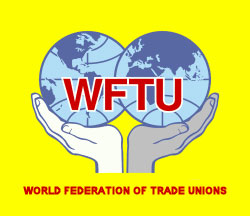Stop disinvestment and strategic sale of public sector undertakings – this is one of the major demands of the joint trade union movement.
Why does the government want to privatise and dismantle the public sector, in the first place?
Privatisation is one of the major components of neoliberal policies, to which both the Congress and the BJP are committed – privatisation of public enterprises, public resources and public services etc. It is a method of handing over public property, property belonging to the people, to private corporates, so that they can amass wealth at the cost of the nation.
Privatisation process in our country was initiated under the Congress regime in 1991, when the neoliberal policies were officially introduced. Attempts to privatise the public sector undertakings, hand over control and management of public resources to private players continued since then. However, they had to retreat in the face of strong opposition from the united working class movement and the people; when the Left parties, who consistently opposed privatisation, had a strong presence in the Parliament.
Now, with the BJP government coming to power at the centre with its own majority in 2014, this process has gained momentum.
Soon after coming to power this BJP government dismantled the Planning Commission and replaced it with the NITI (National Institution for Transforming India) Ayog. The NITI Ayog was entrusted with the task of identifying public sector undertakings for disinvestment and strategic sale. It has identified 74 PSUs including 26 for downright closure and 10 for strategic disinvestment. It is pushing for disinvestment of PSUs till strategic sale is concluded.
The government has decided to sell off several sick and loss making companies with huge assets. If it finds no buyer, these will be closed off. In fact, many of these units were deliberately made sick by successive governments. Even today, these units can be made profitable by infusing the necessary capital and ensuring proper functioning. The huge assets that they possess can be utilised for this purpose. But the government does not want to do that. It is keen to hand them along with their assets to the private players at throw away prices.
This BJP led government has also decided to privatise almost all profit making public sector companies, most of them in the strategic and core sectors of the economy. Central public sector units in various sectors including defence, steel, power, general insurance, drugs and pharmaceuticals, aviation, heavy engineering and construction etc are targeted for privatisation. In the last three years, the government has stripped most of the profit making PSUs of all their reserves and surpluses. This was done purposefully to lower their market value so that they can be sold at dirt cheap price to the private companies.
The government is not only selling the shares in public sector; it has also decided to allow foreign direct investment (FDI) in almost all the key sectors of our economy – in defence, railways, banking, insurance, pension funds, coal, petroleum, mining, power, telecom, civil aviation, satellites, construction, multi brand retail, pharmaceuticals etc. This will lead to the big foreign corporations dominating these sectors in our country. Ultimately our nation will lose control over these most strategic sectors of our economy. Our national sovereignty will be seriously affected.
The most outrageous are the attempts by this BJP led government, which claims to be the sole champion and custodian of ‘nationalism’, to privatise our defence sector and the railways. CITU has published a small booklet separately on the impact of defence sector privatisation on our national sovereignty and another on the anti people character of railway privatisation. It has also published a pamphlet detailing the public sector units that are being privatised. We request all CITU members and other workers as well to go through them.
But what we want to emphasise here is that privatisation of public sector is not something that concerns the public sector workers alone. It is not merely an onslaught on public sector workers, their rights and their jobs.
Public sector has been instrumental for our country attaining self reliant economy; in creating the industrial base of the country after independence. It was the public sector enterprises which built the major infrastructure of the country like power, transport including railways, roads etc when the private sector did not have the capacity or was not ready to take the risk of investing huge amounts of capital in these sectors, which do not provide immediate profits. Thermal, hydro and nuclear power projects, transport and communication, production of steel, defence equipment, ship building, oil, coal etc were set up in the public sector. The Research and Development taken up by the PSUs had a huge contribution in our technological and industrial advance.
It has played an important role in developing balanced regional growth. The townships constructed in the areas where the PSUs were located, many in remote underdeveloped rural areas, not only provided housing and other facilities for the workers like schools, hospitals, dispensaries, community centres, shopping complexes etc but also led to overall development of the entire area. Thousands of people in the surrounding villages benefited indirectly by getting employment and income opportunities by providing different services to the people in these townships.
By implementing the reservations for SC/ ST sections, PSUs provided employment and opportunities for development of these sections. Despite limitations, they have contributed to social justice. It helped in industrialisation including to the growth of private sector in the surrounding areas.
It has become fashionable for the advocates of neoliberal reforms to portray public sector as ‘white elephants’ eating away the scarce government resources. But the reality is otherwise.
There are innumerable instances of tax evasion, manipulation of accounts etc by the private sector establishments including the big corporates, national and multinational. Government figures themselves inform that every year, the national exchequer is robbed of not less than Rs 5 lakh crore through such manipulations. In 2015-16 alone, direct tax evasion amounted to Rs 6.59 lakh crore. But the government is not ready to take any action against them.
In contrast, public sector not only scrupulously pays its taxes but also makes huge contribution to the government through dividends, special dividends etc. In 2014-15 the PSUs contributed more than Rs 2 lakh crore to the public exchequer.
The public sector and their huge assets are the wealth of the nation. Strategic sale and privatisation mean handing over this wealth belonging to the people to private corporates, both domestic and foreign.
It is an attack on the basic fabric of our national economy. It is an attack on self reliance and the country’s manufacturing capability.
It is an attack on the entire people, an onslaught on SC/STs right to reservation in jobs. It is an attack on the entire society.
Hence struggle against privatisation cannot be considered the responsibility of public sector workers only and left to them alone. Entire trade union movement has to get involved fully in this struggle. Working class movement has to take the initiative in rallying the entire people in this struggle against privatisation.



